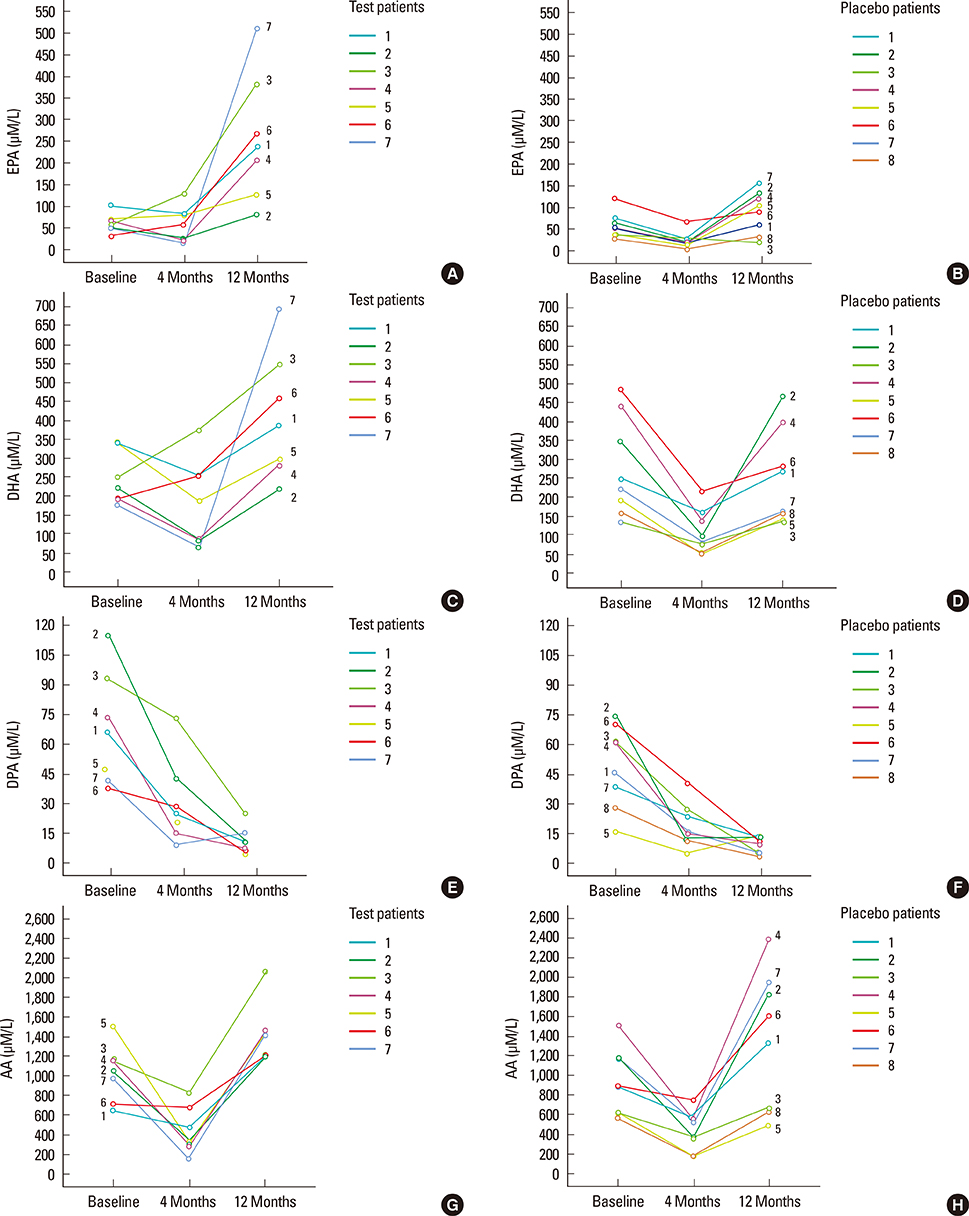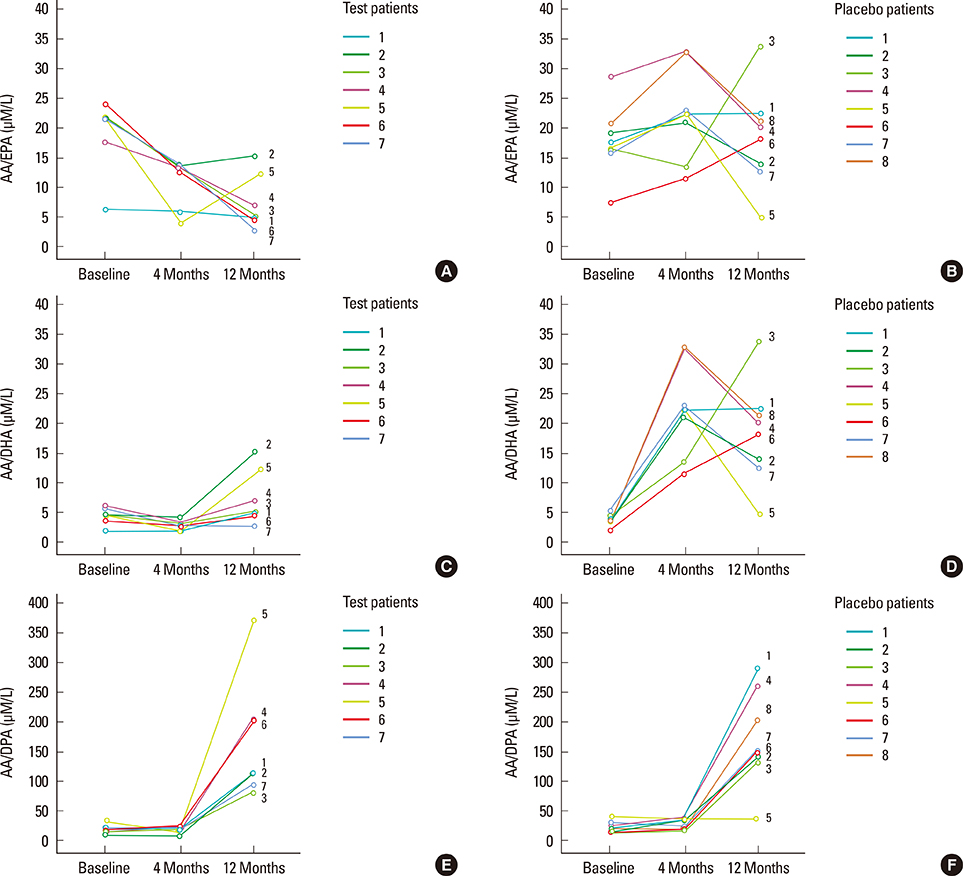J Periodontal Implant Sci.
2014 Aug;44(4):169-177. 10.5051/jpis.2014.44.4.169.
Serum level changes of long chain-polyunsaturated fatty acids in patients undergoing periodontal therapy combined with one year of omega-3 supplementation: a pilot randomized clinical trial
- Affiliations
-
- 1Institute of Odontology, Department of Periodontology, Rio de Janeiro State University, Rio de Janeiro, Brazil. cmfigueredo@hotmail.com
- 2Institute of Nutrition, Rio de Janeiro State University, Rio de Janeiro, Brazil.
- 3Institute of Biology, Laboratory of Pharmacology, Biomedical Center, Rio de Janeiro State University, Rio de Janeiro, Brazil.
- 4Institute of Odontology, Department of Periodontology, Veiga de Almeida University, Rio de Janeiro, Brazil.
- 5Institute of Odontology, Division of Periodontology, Karolinska Institute, Stockholm, Sweden.
- KMID: 2212010
- DOI: http://doi.org/10.5051/jpis.2014.44.4.169
Abstract
- PURPOSE
We aimed to investigate the impact of nonsurgical periodontal treatment combined with one-year dietary supplementation with omega (omega)-3 on the serum levels of eicosapentaenoic acid (EPA), docosahexaenoic acid (DHA), docosapentaenoic acid (DPA), and arachidonic acid (AA).
METHODS
Fifteen patients with chronic generalized periodontitis were treated with scaling and root planing. The test group consisted of seven patients (43.1+/-6.0 years) supplemented with omega-3, consisting of EPA plus DHA, three capsules, each of 300 mg of omega-3 (180-mg EPA/120-mg DHA), for 12 months. The control group was composed of eight patients (46.1+/-11.6 years) that took a placebo capsule for 12 months. The periodontal examination and the serum levels of DPA, EPA, DHA, and AA were performed at baseline (T0), and 4 (T1), and 12 (T2) months after therapy.
RESULTS
In the test group, AA and DPA levels had been reduced significantly at T1 (P<0.05). AA and EPA levels had been increased significantly at T2 (P<0.05). The DeltaEPA was significantly higher in the test compared to the placebo group at T2-T0 (P=0.02). The AA/EPA had decreased significantly at T1 and T2 relative to baseline (P<0.05).
CONCLUSIONS
Nonsurgical periodontal treatment combined with omega-3 supplementation significantly increased the EPA levels and decreased the AA/EPA ratio in serum after one year follow-up. However, no effect on the clinical outcome of periodontal therapy was observed.
Keyword
MeSH Terms
Figure
Reference
-
1. Seymour GJ, Gemmell E. Cytokines in periodontal disease: where to from here? Acta Odontol Scand. 2001; 59:167–173.
Article2. Ott J, Hiesgen C, Mayer K. Lipids in critical care medicine. Prostaglandins Leukot Essent Fatty Acids. 2011; 85:267–273.
Article3. Figueredo CM, Martinez GL, Koury JC, Fischer RG, Gustafsson A. Serum levels of long-chain polyunsaturated fatty acids in patients with periodontal disease. J Periodontol. 2013; 84:675–682.
Article4. Martinez GL, Koury JC, Brito F, Fischer RG, Gustafsson A, Figueredo CM. The impact of non-surgical periodontal treatment on serum levels of long chain-polyunsaturated fatty acids: a pilot randomized clinical trial. J Periodontal Res. 2014; 49:268–274.
Article5. Sijben JW, Calder PC. Differential immunomodulation with long-chain n-3 PUFA in health and chronic disease. Proc Nutr Soc. 2007; 66:237–259.
Article6. El-Sharkawy H, Aboelsaad N, Eliwa M, Darweesh M, Alshahat M, Kantarci A, et al. Adjunctive treatment of chronic periodontitis with daily dietary supplementation with omega-3 Fatty acids and low-dose aspirin. J Periodontol. 2010; 81:1635–1643.
Article7. Elkhouli AM. The efficacy of host response modulation therapy (omega-3 plus low-dose aspirin) as an adjunctive treatment of chronic periodontitis (clinical and biochemical study). J Periodontal Res. 2011; 46:261–268.
Article8. Sonestedt E, Ericson U, Gullberg B, Skog K, Olsson H, Wirfalt E. Do both heterocyclic amines and omega-6 polyunsaturated fatty acids contribute to the incidence of breast cancer in postmenopausal women of the Malmö diet and cancer cohort? Int J Cancer. 2008; 123:1637–1643.
Article9. Khanaki K, Nouri M, Ardekani AM, Ghassemzadeh A, Shahnazi V, Sadeghi MR, et al. Evaluation of the relationship between endometriosis and omega-3 and omega-6 polyunsaturated fatty acids. Iran Biomed J. 2012; 16:38–43.10. Simopoulos AP. Omega-3 fatty acids in inflammation and autoimmune diseases. J Am Coll Nutr. 2002; 21:495–505.11. Hayakawa S, Yoshikawa D, Ishii H, Tanaka M, Kumagai S, Matsumoto M, et al. Association of plasma ω-3 to ω-6 polyunsaturated fatty acid ratio with complexity of coronary artery lesion. Intern Med. 2012; 51:1009–1014.
Article12. Naqvi AZ, Buettner C, Phillips RS, Davis RB, Mukamal KJ. n-3 fatty acids and periodontitis in US adults. J Am Diet Assoc. 2010; 110:1669–1675.
Article13. Fats and fatty acids in human nutrition. Proceedings of the Joint FAO/WHO Expert Consultation. November 10-14, 2008. Geneva, Switzerland. Ann Nutr Metab. 2009; 55:5–300.
Article14. Tong H, Rappold AG, Diaz-Sanchez D, Steck SE, Berntsen J, Cascio WE, et al. Omega-3 fatty acid supplementation appears to attenuate particulate air pollution-induced cardiac effects and lipid changes in healthy middle-aged adults. Environ Health Perspect. 2012; 120:952–957.
Article15. Dawczynski C, Schubert R, Hein G, Muller A, Eidner T, Vogelsang H, et al. Long-term moderate intervention with n-3 long-chain PUFA-supplemented dairy products: effects on pathophysiological biomarkers in patients with rheumatoid arthritis. Br J Nutr. 2009; 101:1517–1526.
Article16. Gillies D, Sinn JKh, Lad SS, Leach MJ, Ross MJ. Polyunsaturated fatty acids (PUFA) for attention deficit hyperactivity disorder (ADHD) in children and adolescents. Cochrane Database Syst Rev. 2012; 7:CD007986.
Article17. Sydenham E, Dangour AD, Lim WS. Omega 3 fatty acid for the prevention of cognitive decline and dementia. Cochrane Database Syst Rev. 2012; 6:CD005379.18. Liu T, Korantzopoulos P, Shehata M, Li G, Wang X, Kaul S. Prevention of atrial fibrillation with omega-3 fatty acids: a meta-analysis of randomised clinical trials. Heart. 2011; 97:1034–1040.19. James S, Montgomery P, Williams K. Omega-3 fatty acids supplementation for autism spectrum disorders (ASD). Cochrane Database Syst Rev. 2011; (11):CD007992.
Article20. Friedman A, Moe S. Review of the effects of omega-3 supplementation in dialysis patients. Clin J Am Soc Nephrol. 2006; 1:182–192.
Article21. Armitage GC. Development of a classification system for periodontal diseases and conditions. Ann Periodontol. 1999; 4:1–6.22. WHO Expert Committee on Physical Status. The use and interpretation of anthropometry. Geneva: World Health Organization;1995.23. Rasmussen LE, Svensson M, Jorgensen KA, Schmidt EB, Christensen JH. The content of docosahexaenoic acid in serum phospholipid is inversely correlated with plasma homocysteine levels in patients with end-stage renal disease. Nutr Res. 2010; 30:535–540.24. Fredman G, Serhan CN. Specialized proresolving mediator targets for RvE1 and RvD1 in peripheral blood and mechanisms of resolution. Biochem J. 2011; 437:185–197.25. Gebauer SK, Psota TL, Harris WS, Kris-Etherton PM. n-3 fatty acid dietary recommendations and food sources to achieve essentiality and cardiovascular benefits. Am J Clin Nutr. 2006; 83:6 Suppl. 1526S–1535S.
Article26. Simopoulos AP. Omega-6/omega-3 essential fatty acids: biological effects. World Rev Nutr Diet. 2009; 99:1–16.
Article27. Russo GL. Dietary n-6 and n-3 polyunsaturated fatty acids: from biochemistry to clinical implications in cardiovascular prevention. Biochem Pharmacol. 2009; 77:937–946.
Article28. Caramia G. The essential fatty acids omega-6 and omega-3: from their discovery to their use in therapy. Minerva Pediatr. 2008; 60:219–233.
Article29. Gómez Candela C, Bermejo Lopez LM, Loria Kohen V. Importance of a balanced omega 6/omega 3 ratio for the maintenance of health: nutritional recommendations. Nutr Hosp. 2011; 26:323–329.
Article30. Rosenstein ED, Kushner LJ, Kramer N, Kazandjian G. Pilot study of dietary fatty acid supplementation in the treatment of adult periodontitis. Prostaglandins Leukot Essent Fatty Acids. 2003; 68:213–218.
Article31. Hartweg J, Perera R, Montori V, Dinneen S, Neil HA, Farmer A. Omega-3 polyunsaturated fatty acids (PUFA) for type 2 diabetes mellitus. Cochrane Database Syst Rev. 2008; (1):CD003205.
Article32. Akinkuolie AO, Ngwa JS, Meigs JB, Djousse L. Omega-3 polyunsaturated fatty acid and insulin sensitivity: a meta-analysis of randomized controlled trials. Clin Nutr. 2011; 30:702–707.
Article33. Jacobson TA, Glickstein SB, Rowe JD, Soni PN. Effects of eicosapentaenoic acid and docosahexaenoic acid on low-density lipoprotein cholesterol and other lipids: a review. J Clin Lipidol. 2012; 6:5–18.
Article34. Ryan AS, Keske MA, Hoffman JP, Nelson EB. Clinical overview of algal-docosahexaenoic acid: effects on triglyceride levels and other cardiovascular risk factors. Am J Ther. 2009; 16:183–192.
Article
- Full Text Links
- Actions
-
Cited
- CITED
-
- Close
- Share
- Similar articles
-
- Omega-3 Polyunsaturated Fatty Acid for Cholestasis due to Bile Duct Paucity
- Omega 3 fatty acids as a host modulator in chronic periodontitis patients: a randomised, double-blind, palcebo-controlled, clinical trial
- Nutrition Support in Liver Transplantation Patients
- Analysis of Plasma Long-Chain Fatty Acids in Hypertensive Patients
- Omega-3 Index as a Risk Factor for Cardiovascular Disease and Its Application to Korean Population



